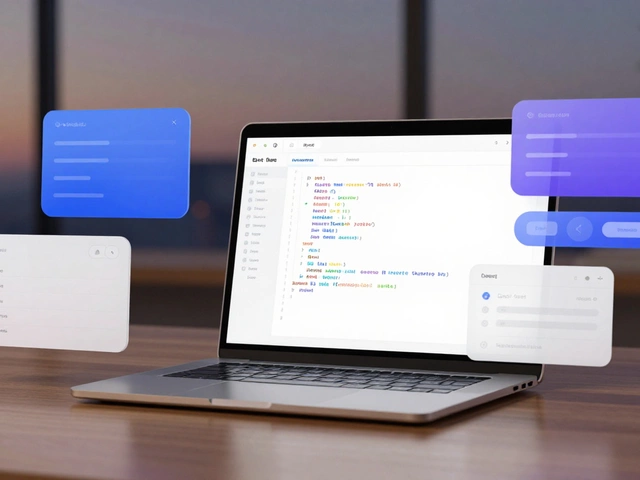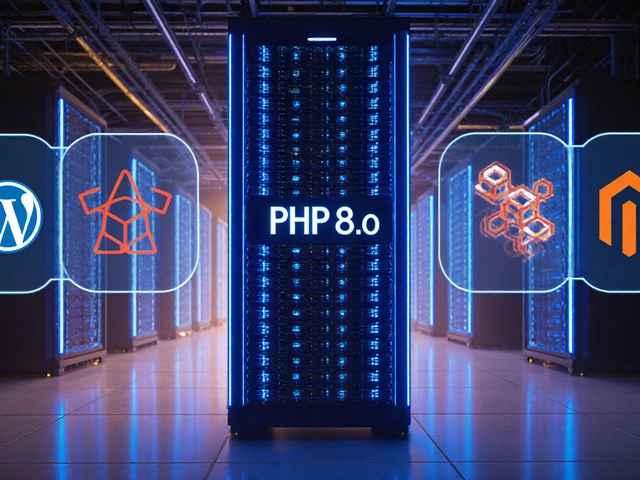Ever wonder if PHP is still a thing in 2025? Believe it or not, this language that kicked off many web projects back in the day is still very much alive. Sure, new kids like Node.js and Python are the talk of the town, and everyone seems to have an opinion about which one is the best. But PHP holds its ground—especially if you're diving into web development with platforms like WordPress.
Why? For starters, PHP is not stuck in the past; it’s been getting better over time. With the release of PHP 8, developers got access to some nifty features that made life a little easier, like Just-In-Time compilation and improved error handling. If you’ve ever fought with code at 3 a.m., you know how vital good error messages are!
Also, let’s talk about community and resources. PHP’s got a massive pool of tutorials, forums, and even pre-built components thanks to its longstanding presence. You’re never really alone in your PHP journey because someone out there has probably faced the same hurdles. Need guidance? Resources are just a Google search away.
However, it’s not all sunshine and roses. PHP does face competition from other languages, especially when performance and scalability are crucial. That's where picking the right one becomes more about matching the tool to the job rather than the language’s popularity contest.
- The Current State of PHP
- PHP vs. Emerging Technologies
- When to Choose PHP for Your Project
- Tips for Modern PHP Development
- The Future of PHP
The Current State of PHP
Even as technology races ahead, PHP development stands firm, powering around 77.6% of websites according to W3Techs in early 2025. The versatility of PHP allows it to run dynamic sites and handle backend operations efficiently in a world where new frameworks and languages pop up every other week. So why do developers stick with it?
What's in PHP 8?
The release of PHP 8 was a game-changer, making sure the language kept up with the times. The standout feature? Just-In-Time (JIT) compilation. It’s like turbocharging your script execution, meaning better performance without the need for complex hacks. Plus, the tighter error handling means fewer head-scratch moments when your code acts up.
“PHP 8 has finally made PHP compelling again,” said Nikita Popov, a prominent PHP core developer.
Upgrades like these ensure that PHP remains modern despite its age. The community is always eager to push the language forward, guaranteeing that PHP development doesn’t stagnate.
Community and Ecosystem
Speaking of community, PHP has a vast network of developers who contribute to its growth. Massive frameworks like Laravel or Symfony offer robust tools out of the box, allowing you to build complex applications with speed and confidence. Ever tried finding a library for PHP code? Packagist, the primary repository, hosts over 282,000 packages as of now. It's like a treasure trove for developers in need.
Thanks to such lively participation, PHP stays updated with developer trends and industry needs. It’s not just legacy projects keeping it alive; even fresh, exciting projects choose PHP to leverage its tried-and-tested stability and ease of use.
| Feature | PHP 8 | Previous Versions |
|---|---|---|
| JIT Compilation | Yes | No |
| Error Handling | Improved | Basic |
While the web development landscape continues to diversify, PHP’s reliability cements its position as a go-to for developers worldwide, from newbies crafting their first site to seasoned pros managing intricate systems.
PHP vs. Emerging Technologies
The tech landscape is always buzzing with the "next big thing," and in recent years, languages like JavaScript, particularly with frameworks such as Node.js, and Python have grabbed attention. So how does PHP compare with these shiny newcomers?
Speed and Performance
Let’s start with speed. Node.js, using the V8 engine, is known for handling multiple connections concurrently, which makes it a beast for real-time applications. PHP, traditionally synchronous, has been catching up with PHP-FPM and asynchronous processing through frameworks like ReactPHP. It might not match Node.js in non-blocking I/O, but it’s no slouch for most web applications.
Community and Support
When it comes to community sizes, PHP still has one of the largest on the planet. Whether you’re digging through Stack Overflow or GitHub, you’ll find heaps of resources. Python's community has grown massively due to its diverse applications beyond web development, like data science. But for web-focused projects, PHP’s mature and dedicated community helps ensure you’re never alone.
Server Setup
Setting up a PHP environment is usually straightforward. It’s been the go-to for shared hosting services for years. Most servers come with PHP pre-installed, while deploying Node.js or Python might need more tinkering if you are working outside specialized platforms like Heroku.
- PHP runs on almost every server out there. If you have a cheap hosting plan, it's likely built for PHP.
- Node.js can require specific environments, but platforms like DigitalOcean or AWS have made deploying much easier.
- Python setups, especially for web, often use virtual environments and can require more setup time.
Language Evolution
PHP isn't static. With PHP 8, the language introduced features that align more closely with modern programming practices. This release began closing the gap between PHP and high-demand languages by enhancing performance and developer experience.
In terms of versatility, while PHP excels in web development, Python offers broader use cases in areas like artificial intelligence, compelling many to choose it for data-driven projects.
So, is PHP obsolete? Definitely not. It still holds strong, especially in web environments where its capabilities align well with many types of projects. However, choosing the “best” language is about the specific needs of your project, not the headlines or trends.

When to Choose PHP for Your Project
Choosing the right tech stack for your project is like choosing the right tool for a job—you wouldn't use a hammer to screw in a light bulb, right? So, when does PHP development make sense for your new project in 2025? Let’s dive into some scenarios.
Content-Heavy Websites
If you're planning a content-driven site or a blogging platform, PHP is a proven warrior. From legacy giants like Wordpress to modern frameworks such as Laravel, PHP shines at powering sites where content management is king. It handles databases, user authentication, and templates with efficiency.
Cost-Effectiveness
Budget an important factor? PHP might just be your go-to. Since it’s open-source, you avoid hefty licensing fees. Plus, with so many developers familiar with PHP, you’re likely to find talent at competitive rates compared to niche languages.
Community and Support
A project feels less daunting when backed by a vast community. With PHP, expect tons of documentation, tutorials, and forums ready to lend a hand. Communities around PHP are vibrant and there’s a good chance any issue you face has already been solved.
Flexibility and Scale
Building an initial MVP (Minimum Viable Product) that you plan to scale later? PHP, paired with a framework like Laravel, offers flexibility for rapid development, allowing you to iterate fast and adapt. And it can handle growth; many scaling solutions and tools are available.
| Project Type | Why Choose PHP |
|---|---|
| Content Management Systems | Proven track record, wide support |
| eCommerce Sites | Robust frameworks like Magento |
| Corporate Websites | Cost-effective, quick iteration |
Of course, the decision is not all sunshine and rainbows. PHP may not be the best for real-time or compute-heavy applications. Yet for many web development scenarios, it’s still a solid contender. Consider your project’s specific needs and you might find PHP is exactly what you're looking for.
Tips for Modern PHP Development
If you're diving into PHP development today, there are a few pointers to keep your project future-proof. First up, make sure you're working with the latest version of PHP. Updates are rolling in regularly, and they often include performance boosts and security patches. Working with the latest version means you'll have access to these improvements.
Embrace Modern PHP Features
Modern PHP comes with a suite of new features that make coding cleaner and more efficient. For instance, PHP 8 introduced the JIT (Just-In-Time) compilation, which can noticeably improve execution speed for certain operations. Exploring attributes can also simplify your PHP code by reducing boilerplate.
Use PHP Frameworks
Frameworks like Laravel or Symfony can dramatically speed up development. They provide a solid structure to work with and come packed with solutions for common tasks, such as database operations, templating, and routing. These frameworks are tailored to modern web application needs and keep pace with the latest in Laravel and Symfony development trends.
Focus on Security
Don't overlook security, especially when dealing with web applications. Use prepared statements for SQL queries to avoid injections and always validate user input. Libraries like Helmut help safeguard sensitive data effortlessly.
Optimize Performance
Performance is paramount in web development. Use caching mechanisms like Memcached or Redis to reduce server load and improve response times. Remember, a fast application keeps users happy and engaged.
Testing, Testing, Testing
Incorporate automated testing into your development process. PHPUnit is a great tool for writing unit tests. When your code is battle-tested before hitting production, you ensure robust and reliable outcomes.
By keeping these tips in mind, your PHP development projects will be ready to tackle the challenges of today and tomorrow's web landscapes.

The Future of PHP
So, what does the future look like for PHP? What keeps this coding language relevant when so many new options pop up? Well, there are a few solid reasons PHP will probably stick around, and maybe even get stronger in 2025 and beyond.
Continuous Evolution
PHP isn’t just sitting on its laurels. With every new version, it shows up with fresh features and boosts in performance. PHP 8 was a big game changer, but we can expect even more. There's a focus on integrating modern practices, and that's a big deal.
Strong Community Support
One of PHP’s superpowers is its massive community. Devs across the world contribute to its development, creating frameworks and tools that make life a lot easier. Laravel, Symfony, and other frameworks are growing too, helping PHP to stay in the race with more modern programming languages.
Job Market and Demand
If you're eyeing the job market, PHP still holds strong. Various stats show that PHP powers nearly 80% of websites whose server-side language is known. Businesses small and large need upkeep for their existing sites or new projects, which means securing work isn't too hard when you know PHP.
Compatibility with Modern Tech
PHP is also bridging the gap with other technologies. Working alongside new projects often involves integration with APIs or handling big data, and PHP is getting better at playing well with these modern trends.
| PHP Version | Main Feature |
|---|---|
| PHP 7.4 | Preloading and Typed Properties |
| PHP 8.0 | Just-In-Time Compilation and Union Types |
| PHP 8.1 | Enums and Fibers |
All in all, the future of PHP seems pretty solid. It might not wear the flashy new outfit of a trendy language, but it's reliable, gets the job done, and keeps evolving. So, if you're thinking about using PHP for new projects, you can confidently say it's still a valid choice.





